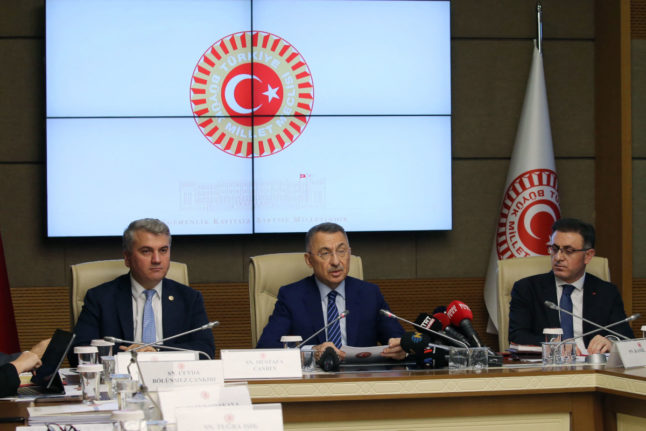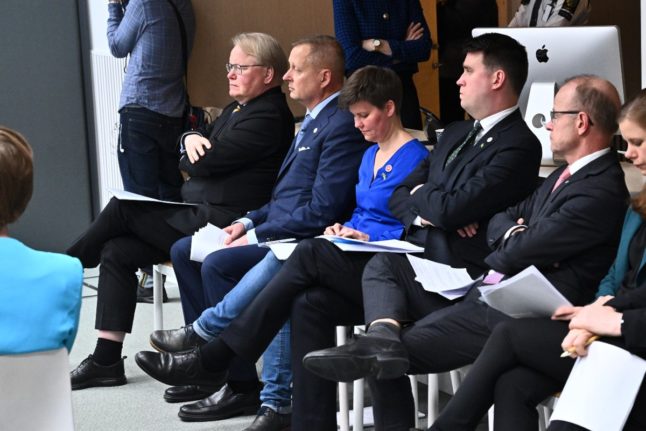Sweden’s Nato bid had been stalled for months amid opposition from Turkey and Hungary and recently it was further complicated after President Recep Tayyip Erdogan linked it to Ankara’s request for F-16 fighter jets from its ally the United States.
Sweden and Finland dropped decades of military non-alignment and sought to join the US-led defence organisation after Russia invaded Ukraine in February 2022.
Their bids won fast-track approval from all Nato members except Turkey and Hungary. Decisions within the alliance must be unanimous. The two ultimately relented and Finland was accepted as Nato’s 31st member in April.
Turkey and Hungary remain the only North Atlantic Treaty Organization members left to ratify Sweden’s bid 19 months after it applied for membership.
On Tuesday, the Turkish parliament’s foreign affairs committee approved the measure.
“The protocol (on Sweden’s Nato accession) passed the committee,” opposition CHP party lawmaker Utku Cakirozer, a member of the foreign affairs committee, told AFP after the vote.
The move paves the way for a vote by the full parliament, where Erdogan’s ruling alliance holds the majority of seats. It was not immediately clear when it would be.
‘Stronger’
Nato chief Jens Stoltenberg hailed the parliament committee vote, and said he counted on Turkey and Hungary to complete their ratifications “as soon as possible”.
“Sweden’s membership will make Nato stronger,” he said in a statement.
Sweden’s foreign minister said the next step was the vote in the Turkish parliament.
“We look forward to becoming a member of Nato,” Tobias Billström told Swedish public television broadcaster SVT Nyheter.
Erdogan in July lifted his objections to Sweden’s Nato membership after Stockholm cracked down on Kurdish groups that Ankara calls terrorists.
Nato allies have piled pressure on Turkey, with France saying the credibility of the alliance was “at stake”.
In December, Erdogan had linked Sweden’s membership to the US Congress “simultaneously” agreeing to sell F-16 fighter jets to Turkey. He also said Nato allies including Canada should lift arms embargoes imposed on Ankara.
F-16 sales
“Sweden’s Nato membership and F-16 sales to Turkey will be handled in coordination to some extent… because unfortunately, neither country trusts the other,” Ozgur Unluhisarcikli, the Ankara office director of the US German Marshall Fund think tank, told AFP.
Turkey’s ageing air force has suffered from Ankara’s expulsion from the US-led F-35 joint strike fighter programme in 2019.
This was in retaliation for Erdogan’s decision to acquire an advanced Russian missile defence system that Nato views as an operational security threat.
US President Joe Biden’s administration has repeatedly promised to move forward with the $20-billion F-16 sale but lawmakers have blocked it over concerns about Turkey’s alleged violations of human rights and long-running tensions with Greece.
“There is no strong consensus in the parliament on Sweden’s Nato membership, nor in the US Congress on the sale of F-16s to Turkey,” Unluhisarcikli said.
Erdogan’s anti-Israel rhetoric after the start of its war with Hamas had raised concerns in Washington.
“Although the issues are not related, Turkey’s statements supporting Hamas further complicated the F-16 process,” Unluhisarcikli said, adding that the killing of Turkish soldiers by Kurdish militants last weekend could also factor into Sweden’s Nato membership.
“But if Biden and Erdogan show the necessary will, we can expect the process to be concluded soon,” he added.



 Please whitelist us to continue reading.
Please whitelist us to continue reading.
Member comments